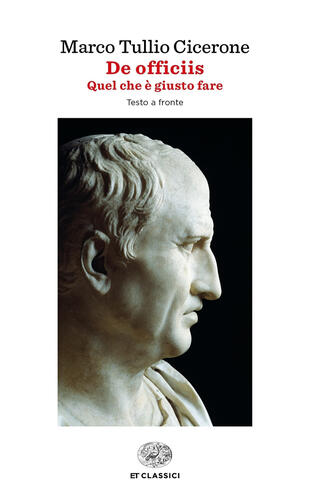

Sinossi
Nel 44 a. C., in un periodo di profonda crisi delle istituzioni sociali e politiche di Roma, Cicerone dedica al figlio Marco un trattato che intende riordinare le forme dell'interazione tra i cittadini e rifondare la res publica. Consapevole che l'antico sistema di valori è ormai superato, Cicerone tenta di organizzare un sistema di trasmissione della memoria fra generazioni, regole di comportamento che indichino «quel che è giusto fare» ai giovani della città, cui tocca ripartire dalle rovine ancora fumanti dello Stato. Una specie di «Etica spiegata a mio figlio», come si intitolerebbe oggi, che è diventata uno snodo fondamentale per il mondo latino, medievale e moderno, permeando la cultura occidentale fino ai giorni nostri.
- ISBN:
- Casa Editrice:
- Pagine: 363
- Data di uscita: 03-09-2019
Recensioni
I have to admit, I'm not so great with reading the philosophers but when I started reading this book from the library, I realized I had to go out and buy my own edition so I could mark it up to my heart's content!! I didn't "learn" anything new as the values and ethics espoused in this treatise are
“Cicero, like thoughtful men of every age, knew that the reason vicious leaders like Caesar could rise to power was because the Roman population itself had been corrupted and no longer pursued the old virtues; a leader is, after all, a mirror of the people who choose him or at least allow him to ret Leggi tutto
Originally written for his son Marcus, this treatise expounds principles for a honorable life. The three books deal with 1) what is honorable, 2) what is useful and 3) what to do when the honorable "conflicts" with the useful. In the end, Cicero argues that that which is honorable is also useful and Leggi tutto
Cicero's book is intelligent and charming, though his usual--how can I put this?--hatred of poor people does dull through the brilliance. But you shouldn't really need a goodreads review to convince you to read this book, which is tremendously important for the history of ideas Europe. You might nee Leggi tutto
De Officiis, or “On Duties,” was the second book printed on Gutenberg’s printing press. Apparently, Gutenberg and his other contemporaries knew how important the press was so they wanted to give props to the Bible, as the most important book ever written/compiled—but along those lines he decided to Leggi tutto
On Obligations ( De officiis ) was written in 44 BC, shortly after Caesar’s assassination and shortly before Cicero’s own. Cicero discusses the nature of the honorable, our obligation to pursue the honorable through the exercise of four cardinal virtues (wisdom, justice, beneficence, and magnanimity), Leggi tutto
This book was written shortly after Caesar’s assassination in 44 B.C., and was heavily influenced by the Stoic school of philosophy. It could be said that this is a more historical than theoretical book, which makes it more practical in the light of daily experiences in a more direct way than other Leggi tutto
Citazioni
Al momento non ci sono citazioni, inserisci tu la prima!























